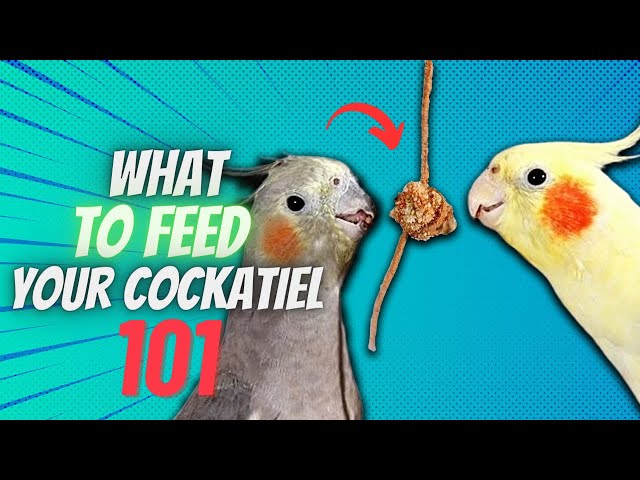Understanding Cockatiel Diet
Feeding your cockatiel right is more than just a routine; it’s the secret sauce to keeping them chipper and living long. Getting the hang of what goes into their meals means knowing what they gobble up in the wild and making sure they’re not missing anything when they’re with you.
Natural Diet Variety
Out in the wild, cockatiels snack on a smorgasbord of goodies that keep them ticking over nicely. Their menu is a mix of seeds, fruits, berries, and leafy greens—basically a birdie buffet. This mix-and-match approach is what keeps them in tip-top shape, packing in all the essentials they need for a good life (VCA Hospitals).
Let’s take a quick look at what makes up their wild menu:
| Food Type | Description |
|---|---|
| Seeds | Selection from plants and trees |
| Fruits | Includes berries and tropical treats |
| Vegetation | Leaves, twigs, and grasses |
Knowing what they feast on in nature helps you whip up a similar plate in your home, making sure they’re never running on empty with the vitamins and minerals.
Importance of Balanced Diet
Keeping a cockatiel happy and healthy boils down to balancing their diet. Think of it as a plate full of pellets, fruits, and veggies, all working together to give them the good stuff they need.
Here’s the breakdown of a solid cockatiel meal plan:
- Pellets: These little nuggets should be the main player on their plate. They’re packed with all the nutrients birds need.
- Fruits and Vegetables: Offer a splash of color and nutrients. Strawberries? Yes, please! They’re a hit with cockatiels but best served as an occasional treat (Avian Avenue Forums).
- Proteins: For those buff feathers and toned muscles, lean into options like cooked chicken or turkey, eggs, and legumes (Jibarrate: Exploring the World of Avian Nutrition and Diet).
Want the lowdown on how much of each to serve? Check out our cockatiel diet guide. It’ll give you the scoop on the perfect portions.
Giving them a meal plan that mirrors their nature-loving habits boosts not just their health but also their spirits. And steer clear of no-go foods like avocados and onions—they’re a big no-no (Jibarrate: Exploring the World of Avian Nutrition and Diet).
Stay in the know about keeping your feathery pal in great shape with more tips on cockatiel care and understanding how long you get to enjoy their chirpy company on cockatiel lifespan.
Cockatiel Nutrition Guidelines
Keeping your cockatiel feeling and looking its best means feeding them right. A balanced diet is a must for their feathers to glow, their energy to stay up, and their overall health. This guide dishes out the essentials for feeding your feathered buddy, focusing on pellet food and the right doses of fruits and veggies.
Ideal Pelleted Diet
Pelleted foods are like the superhero of your cockatiel’s diet. They oughta make up about 75-80% of what your cockatiel munches on (VCA Hospitals). These pellets pack all the nutrients your bird needs in every nibble, cutting out the picky eating that seed diets might cause.
Switching your bird from seeds to pellets? Take your time. Try out different flavors and types to see which ones tickle your bird’s taste buds. Just make sure those pellets are made with cockatiels in mind, as birds of different feathers eat differently.
Fruit and Vegetable Proportion
Fresh fruits and veggies are the cherries on top of a cockatiel’s diet — loaded with vitamins, minerals, and whatnot to keep ’em healthy and strong. But easy does it! Balance is key to avoid overloads of sugar or anything that might be bad for them.
How to Balance Fruits and Veggies In Their Diet:
| Type | Proportion of Diet (%) |
|---|---|
| Pellets | 75-80 |
| Fresh Fruits | 10-15 |
| Fresh Vegetables | 10-15 |
Some foods are a no-go, like avocado — stay clear, it’s toxic. Safe goodies like strawberries make for a nice treat on occasion. Check out our handy-dandy article on can cockatiels eat strawberries for the scoop.
Fruits Cockatiels Can Safely Snack On:
- Strawberries
- Blueberries
- Apple slices (seeds out)
- Grapes (can cockatiels eat grapes)
- Bananas (can cockatiels eat bananas)
Veggies That Are A-OK For Your Bird:
- Carrots
- Broccoli
- Spinach
- Peppers (keep those spicy ones away)
- Zucchini
Keep an eye on portions. Fruits and veggies shouldn’t fill more than 20-25% of their dish. Watch how your bird’s tummy takes to new foods, tweak if needed, and stick to their star pelleted diet for regular nourishment.
At the end of the day, a combo of primo pellets with fresh fruits and veggies keeps your cockatiel chirpin’ happy and healthy. For more tasty tidbits, swing by our cockatiel diet guide.
Safe Stuff for Your Feathery Pal
Why Strawberries Rock
Strawberries ain’t just for your morning cereal—they’re safe and quite a hit with cockatiels too. These juicy berries aren’t just tasty; they pack a punch of goodness for your bird. They’re loaded with all the good stuff that can jazz up your bird’s overall health.
- Power-Packed Nutrition: Stuffed with Vitamin C, Vitamin K, potassium, and fiber, strawberries help your bird’s immune system, keep their blood doing its thing, and make sure the food goes down easy.
- Antioxidant Armor: The antioxidants in these red delights defend your bird’s cells against the nasty stuff that tries to wreck ’em.
- Thirst Quencher: With their watery makeup, strawberries help keep your feathered buddy hydrated, especially during those scorching days.
When added to a balanced diet, strawberries have loads to offer. To dig into more about what cockatiels need to munch on, check out our pelleted diet guide.
Keep It Chill: Not Too Much
While strawberries are a solid win, don’t go overboard. Just like with anything else good, too many strawberries can mess with your bird thanks to their sugary kick. Here’s the lowdown on how to keep it cool and safe:
- How Much?: Think small—about a quarter of a strawberry per go. That’s all your bird needs.
- How Often?: Use ’em as a treat, not the main course. Once or twice a week should do the trick, keeping the sugar levels in check while sticking to a balanced diet.
- Wash Up: Always rinse ’em off to ditch any pesticides. No need to worry about those tiny seeds; they’re harmless for your cockatiel (CalopsitteLegante).
| Fruit Type | How Often | Little Bites |
|---|---|---|
| Strawberries | 1-2 times weekly | Quarter of one |
| Grapes | Weekly | Single grape |
| Bananas | Weekly | Small slice |
Wanna know more about what fruits to share? Peek at can cockatiels eat bananas and can cockatiels eat grapes.
Watch For Signs: Keep an eye out for any weird stuff like tummy troubles, runny droppings, looking kinda lazy, or gaining extra ounces. If you spot any of these, tweak the diet a bit (CalopsitteLegante).
For more tips about making sure your bird’s eats are on point, check out our cockatiel diet and care guides. With the right nutrition, your feathery pal will stay lively, healthy, and a bit cheeky!
Diet Related Health Signs
Keeping an eye on what your cockatiels eat isn’t just a feather in your cap—it’s essential for their health and happiness. Knowing the signs to watch for when overfeeding and how to provide a balanced diet can be the key to avoiding common health hiccups.
Monitoring Overfeeding Signs
You wouldn’t believe the trouble a few too many strawberries can cause your feathered buddy. Sure, they’re tasty, but overdoing fruits like strawberries, bursting with natural sugars, can send your bird into a whirlwind of tummy troubles. We’re talking a ticket to diarrhea town and a pass to Lethargy Lane. Not to mention, piling on the grams can put a real damper on their overall well-being.
Here’s a cheat sheet to help you keep your bird’s diet in check:
| Food Category | Recommended Daily Intake |
|---|---|
| Pelleted Diet | 60-70% |
| Fruits | 10-15% |
| Vegetables | 10-15% |
| Seeds and Treats | <5% |
| Protein Sources | <10% |
Significance of Balanced Diet
Getting the mix right in your cockatiel’s food is like finding that sweet harmony in a classic tune. A cocktail of good eats is not just important—it’s life-saving! Birds, especially cockatiels, can run into hurdles like vitamin A deficiency, a shortfall in calcium, or even egg-binding problems, none of which are a fun ride. But most of these are a-okay if you give them a spread of yummy, nutrients-packed grub.
Seeds might be their jam in the wild, but relying on them alone? Nope, that’s like eating French fries for every meal—it misses the mark nutritionally. Instead, create a buffet of high-quality pellets, fruits, veggies, and keep seeds as little more than a treat.
Lean proteins like cooked chicken and eggs are more than just puff; they help those feathers shine and keep your bird feeling sprightly. For the scoop on hitting the perfect balance in your cockatiel’s diet, hop on over to our guide on cockatiel diet.
By keeping their plate colorful and being on the lookout for overeating signs, you’re setting up your cockatiel for a long, healthy flight of life. For more wise tips on nutrition and beyond, check out our other reads on cockatiel care, cockatiel pellets, and cockatiel toys.

